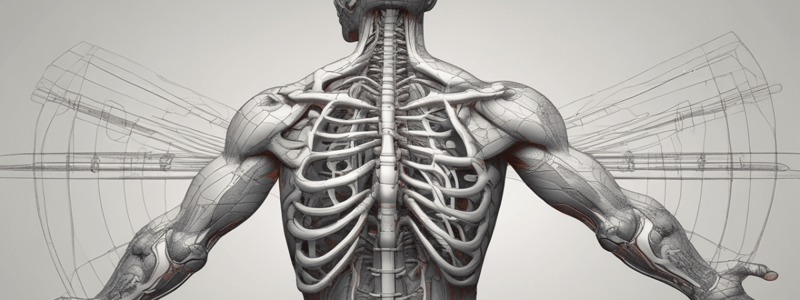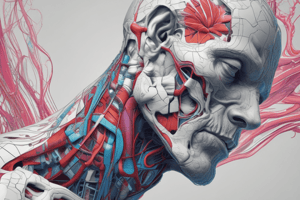Podcast
Questions and Answers
What is the function of the ossicles in the middle ear?
What is the function of the ossicles in the middle ear?
- To convert vibrations to sound in the brain
- To produce sound waves in the outer ear
- To amplify sound waves in the middle ear
- To transmit vibrations from the eardrum to the inner ear (correct)
What is the purpose of the turbinate bones in the nasal cavity?
What is the purpose of the turbinate bones in the nasal cavity?
- To produce mucus in the nasal cavity
- To form the bridge of the nose
- To support the nasal septum
- To warm and humidify air and trap foreign material (correct)
Which bone forms the lower jaw and is the only movable skull bone?
Which bone forms the lower jaw and is the only movable skull bone?
- Mandible (correct)
- Zygomatic bone
- Incisive bone
- Maxillary bone
What is the shape of the hyoid bone?
What is the shape of the hyoid bone?
Which bone forms part of the nasal septum?
Which bone forms part of the nasal septum?
What is the function of the tympanic bulla?
What is the function of the tympanic bulla?
What is the function of the zygomatic bones?
What is the function of the zygomatic bones?
What is the shape of the shaft in dogs, horses, and swine?
What is the shape of the shaft in dogs, horses, and swine?
What articulates with the carpus at its distal end?
What articulates with the carpus at its distal end?
How many rows of carpal bones are there?
How many rows of carpal bones are there?
What is the function of the metacarpal bones?
What is the function of the metacarpal bones?
What is the most medial metacarpal bone in dogs?
What is the most medial metacarpal bone in dogs?
How many bones are in each digit of dogs and cats?
How many bones are in each digit of dogs and cats?
What contains a pointed ungual process?
What contains a pointed ungual process?
In which breeds can sesamoid bones be fractured?
In which breeds can sesamoid bones be fractured?
What is unique about the sacral vertebrae?
What is unique about the sacral vertebrae?
What is the function of the dorsal ends of the ribs?
What is the function of the dorsal ends of the ribs?
What is the name of the bone formed by the fusion of the caudal vertebrae in humans?
What is the name of the bone formed by the fusion of the caudal vertebrae in humans?
What is the purpose of the costal cartilages?
What is the purpose of the costal cartilages?
What is the name of the disease caused by disc degeneration?
What is the name of the disease caused by disc degeneration?
What is the name of the bones that form the lateral part of the thorax?
What is the name of the bones that form the lateral part of the thorax?
What is the sternum also known as?
What is the sternum also known as?
What is the name of the junction where the costal cartilage meets the bony part of the rib?
What is the name of the junction where the costal cartilage meets the bony part of the rib?
What is the main function of the fibula in dogs and cats?
What is the main function of the fibula in dogs and cats?
What is the name of the joint formed by the tibia and the femur?
What is the name of the joint formed by the tibia and the femur?
What is the consequence of a ruptured cruciate ligament?
What is the consequence of a ruptured cruciate ligament?
What is the name of the bony prominence where the patellar ligament attaches?
What is the name of the bony prominence where the patellar ligament attaches?
What is the function of the medial and lateral fabellae?
What is the function of the medial and lateral fabellae?
What is the name of the surgical technique that involves advancing the tibial tuberosity?
What is the name of the surgical technique that involves advancing the tibial tuberosity?
What is the name of the bone that forms the hock with the tarsus?
What is the name of the bone that forms the hock with the tarsus?
How many rows of bones make up the tarsus?
How many rows of bones make up the tarsus?
What is the main function of the calcaneal tuberosity of the fibular tarsal bone?
What is the main function of the calcaneal tuberosity of the fibular tarsal bone?
What is the difference between the metacarpal and metatarsal bones?
What is the difference between the metacarpal and metatarsal bones?
What is the characteristic of the visceral skeleton?
What is the characteristic of the visceral skeleton?
What is the function of the os penis in dogs?
What is the function of the os penis in dogs?
What is the name of the bone that articulates with the distal end of the tibia to form the most movable part of the hock joint?
What is the name of the bone that articulates with the distal end of the tibia to form the most movable part of the hock joint?
What is the characteristic of the phalanges of the pelvic limb?
What is the characteristic of the phalanges of the pelvic limb?
What is the name of the joint between the bones of the hock joint?
What is the name of the joint between the bones of the hock joint?
What is the number of metatarsal bones in the pelvic limb?
What is the number of metatarsal bones in the pelvic limb?
Study Notes
The Auditory System
- The ossicles (Malleus, Incus, and Stapes) transmit vibrations that are converted to sound in the brain.
- The Tympanic bulla is a thin shell of bone at the bottom of the middle ear that houses the middle and inner ear.
Skull - Bones of the Face
- External bones of the face:
- Incisive bones house the upper incisor teeth.
- Nasal bones form the bridge of the nose and vary in size and shape among species and breeds.
- Maxillary bones make up most of the upper jaw and form part of the hard palate.
- Lacrimal bones form part of the eye orbit and house the lacrimal duct for tear drainage.
- Zygomatic bones form part of the eye orbit and join with temporal bones to form zygomatic arches.
- Mandible forms the lower jaw and is the only movable skull bone.
- Internal bones of the face:
- Palatine bones form part of the hard palate.
- Pterygoid bones support part of the pharynx.
- Vomer bone forms part of the nasal septum.
- Turbinates are thin, scroll-like bones that help warm and humidify air and trap foreign material.
Skull - Bones of the Face (Not Examinable)
- Hyoid bone is a U-shaped structure that supports the pharynx.
Axial Skeleton
- Sacral vertebrae are unique in that they fuse to form a single solid structure called the sacrum.
- Caudal (Coccygeal) vertebrae form the bones of the tail and vary in number and appearance among species and individuals.
Intervertebral Disc Disease (IVDD)
- Disc degeneration causes disc material to squeeze out and protrude into the spinal canal, pressing on the spinal cord and causing severe pain, numbness, weakness, and paralysis.
Ribs
- Ribs are flat bones that form the lateral part of the thorax.
- The number of pairs of ribs usually equals the number of thoracic vertebrae.
Sternum
- The sternum, or breastbone, forms the floor of the thorax.
- It is made up of bones called sternebrae, with the first and last sternebrae being named and used as landmarks.
Carpus
- The carpus consists of two rows of carpal bones.
- The proximal row includes the radial carpal bone, ulnar carpal bone, and accessory carpal bone.
- The distal row consists of numbered bones, starting from the medial side and working laterally.
Metacarpus
- The metacarpal bones extend distally from the distal row of carpal bones to the proximal phalanges of the digits.
- Dogs and cats typically have five digits or toes making up their front paws.
- The metacarpal bones are numbered from medial to lateral, with Metacarpal I being the most medial and commonly known as the “dewclaw”.
Phalanges
- Each digit is made up of 2-3 bones called phalanges.
- The digits of dogs and cats contain bones similar to human fingers.
- Digit 1 (the dewclaw) contains two bones: a proximal phalanx and a distal phalanx.
- Digits II to V each contain three bones: a proximal phalanx, a middle phalanx, and a distal phalanx.
Fabellae
- The medial and lateral fabellae are two small sesamoid bones located in the proximal gastrocnemius (calf muscle tendons) just above and behind the femoral condyles of dogs and cats.
Tibia
- The tibia is the main weight-bearing bone of the lower leg.
- It forms the stifle joint with the femur above and the hock joint with the tarsus below.
Fibula
- The fibula is a thin bone that parallels the tibia and serves as a muscle attachment site.
- It does not support any significant weight.
Tarsus (Hock)
- The tarsus is also known as the hock in four-legged animals (humans = ankle).
- It consists of two rows of short bones (tarsal bones).
- The proximal row of bones is named, and the distal row is numbered (from medial to lateral).
Metatarsus
- The metatarsal bones are almost the same as the metacarpal bones.
- The main difference is that there are usually only four digits making up the paw on the hind leg, so only four metatarsal bones: II to V (as no “dew claw or metatarsal I).
Phalanges
- The phalanges of the pelvic limb are almost exactly like the phalanges of the thoracic limb.
- The only major difference is usually only four digits make up the paw on each hind leg: digits II through V.
Visceral Skeleton - Os Penis
- The visceral skeleton consists of bones that form in soft organs or viscera.
- The os penis is a bone in the penis of dogs that partially surrounds the penile portion of the urethra.
Studying That Suits You
Use AI to generate personalized quizzes and flashcards to suit your learning preferences.
Related Documents
Description
Quiz on the anatomy of the auditory system, including the ossicles and Tympanic bulla, and the bones of the face, including the Incisive, Nasal, and Maxillary bones.




